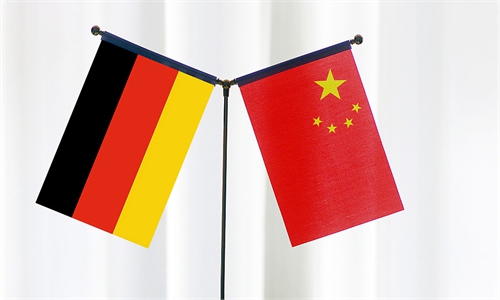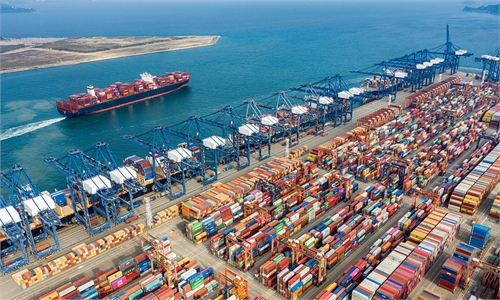
The China-Europe Railway Express loading COVID-19 testing kits sets out from Haicang station in Xiamen, East China's Fujian Province bound for the Port of Duisburg, Germany on April 21, 2021. Photo: VCG
After meeting Chinese State Councilor and Foreign Minister Wang Yi, pledging to refrain from "megaphone diplomacy," German Foreign Minister Annalena Baerbock relapsed to tough talk against China, to the great disappointment of those hoping China-Germany bilateral relationship can develop toward pragmatic cooperation despite all political undercurrents.
In an interview with the Sueddeutsche Zeitung newspaper published on Friday, the German foreign minister said she told her Chinese counterpart that coercion against Lithuania was unacceptable. She also said the EU-China investment treaty a "farce."
Given that Baerbock has long advocated a tough China approach, it is not surprising to see her confuse right and wrong when it comes to China's response toward Lithuania agreeing to the establishment of the "Taiwan Representative Office" in Vilnius.
Lithuania's move not only represents a direct violation of the one-China principle, but also undermines the EU's united policy toward China. Under the current circumstances, it is believed that most EU countries have formed their own judgment and will not let China-EU relations be hijacked by Lithuania's reckless political theater. Still, there is no denying that pro-American forces such as Baerbock may have different views, but this will not create too much uncertainty to China-Germany relations.
The fact that even the hardline Baerbock sees the need to maintain good relations with China, as reflected by the online meeting last week, is a clear indication that it will not be easy for some anti-China forces to derail China-German cooperation.
The German business community has been dissatisfied about the radical rhetoric by German politicians like Baerbock, worrying about the potential impact on bilateral relations, even though they are well aware that there is division in the government's China policy.
For instance, Siemens President and Chairman of the German Economic and Asia-Pacific Council (APA) Roland Busch openly warned some German politicians not to seek confrontation with China and called for a "respectful attitude" toward China, according to German media reports.
The business community's concerns are justified. China is Germany's largest trading partner, with bilateral trade hitting a new record of $235 billion in 2021. Maintaining the stability of bilateral trade and investment relations is crucial for Germany's economic recovery from the coronavirus pandemic.
Moreover, the confidence of German companies in the growth of the Chinese market remains strong, according to an annual Business Confidence Survey released by the German Chamber of Commerce in China, and KPMG. Around 60 percent of the 596 German companies in China that took part in the survey reported improved business operations last year.
For some time, the Green Party's extreme rhetoric on China has made many increasingly concerned about the future of the bilateral relationship. Yet, there are growing signs indicating that the new German government has gradually formed the consensus that it is not in Germany's national interest to joining hands with the US in countering China.
If a German politician cannot see the forest for the trees, then his or her political life won't last long. If the German government goes the wrong way in its China policy, to the detriment of its economy, it is bound to put greater political pressure on the German government.
Fundamentally speaking, the challenge for Germany is neither to take sides in politics nor to align its values with the US, but to continue to develop its economic power. This is because Germany's future development and its ability to play a greater role in Europe and in the world depend on its economic strength, and therefore, cooperation with China is very important.
Meanwhile, China's economic development also needs continued cooperation with global economic powers such as Germany.
Such interdependence has become a consensus, based on which the two governments should further deepen their bilateral relationship, for the sake of the livelihood of their countrymen.


